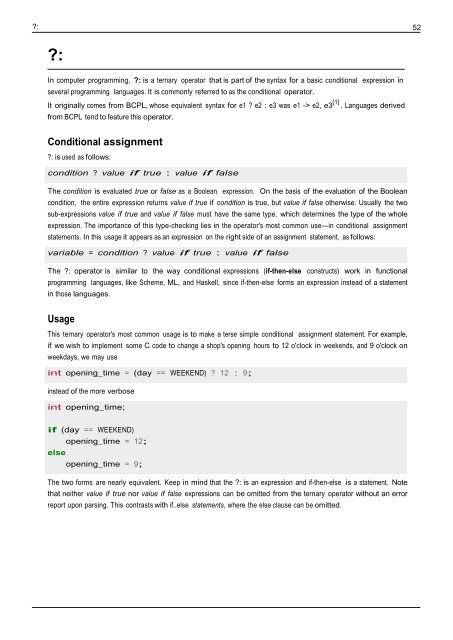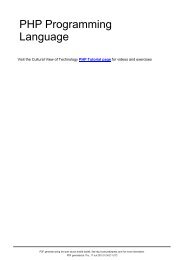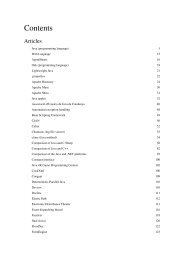Essentials of Javascript - Cultural View
Essentials of Javascript - Cultural View
Essentials of Javascript - Cultural View
Create successful ePaper yourself
Turn your PDF publications into a flip-book with our unique Google optimized e-Paper software.
?: 52<br />
?:<br />
In computer programming, ?: is a ternary operator that is part <strong>of</strong> the syntax for a basic conditional expression in<br />
several programming languages. It is commonly referred to as the conditional operator.<br />
It originally comes from BCPL, whose equivalent syntax for e1 ? e2 : e3 was e1 -> e2, e3 [1] . Languages derived<br />
from BCPL tend to feature this operator.<br />
Conditional assignment<br />
?: is used as follows:<br />
condition ? value if true : value if false<br />
The condition is evaluated true or false as a Boolean expression. On the basis <strong>of</strong> the evaluation <strong>of</strong> the Boolean<br />
condition, the entire expression returns value if true if condition is true, but value if false otherwise. Usually the two<br />
sub-expressions value if true and value if false must have the same type, which determines the type <strong>of</strong> the whole<br />
expression. The importance <strong>of</strong> this type-checking lies in the operator's most common use—in conditional assignment<br />
statements. In this usage it appears as an expression on the right side <strong>of</strong> an assignment statement, as follows:<br />
variable = condition ? value if true : value if false<br />
The ?: operator is similar to the way conditional expressions (if-then-else constructs) work in functional<br />
programming languages, like Scheme, ML, and Haskell, since if-then-else forms an expression instead <strong>of</strong> a statement<br />
in those languages.<br />
Usage<br />
This ternary operator's most common usage is to make a terse simple conditional assignment statement. For example,<br />
if we wish to implement some C code to change a shop's opening hours to 12 o'clock in weekends, and 9 o'clock on<br />
weekdays, we may use<br />
int opening_time = (day == WEEKEND) ? 12 : 9;<br />
instead <strong>of</strong> the more verbose<br />
int opening_time;<br />
if (day == WEEKEND)<br />
else<br />
opening_time = 12;<br />
opening_time = 9;<br />
The two forms are nearly equivalent. Keep in mind that the ?: is an expression and if-then-else is a statement. Note<br />
that neither value if true nor value if false expressions can be omitted from the ternary operator without an error<br />
report upon parsing. This contrasts with if..else statements, where the else clause can be omitted.










